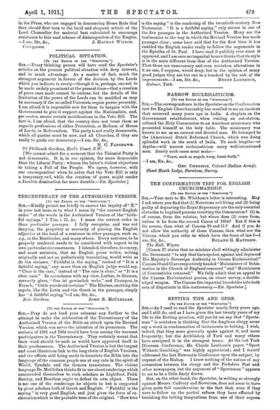TERCENTENARY OF THE AUTHORISED VERSION.
[To THE EDITOR OF THE "SPECTATOR."] SIR,—Kindly permit me briefly to answer the inquiry of" X." in your last issue as to what I mean by "the correct English order" of the words in the Authorised Version of the " faith- ful sayings," 1 Tim. i. 15, &c. I mean the correct order in those particular passages. I fully recognise, and was not denying, the propriety or necessity of placing the. English adjective at the head of a sentence in other passages, such as, e.g., in the Beatitudes, and many others. Every sentence, to be properly rendered, needs to be considered with regard to its own particular circumstances. I intended, therefore, to convey, and must maintain, that no English prose writer, writing originally and not as pedantically translating, would write as do the revisers, " Faithful is the saying," instead of " It is a faithful saying," any more than an English judge would say, " Clear is the case," instead of " The case is clear," or "It is a clear case." In accordance with my view, Luther, in German, correctly gives, " Das ist gewisslich wahr," and Crampon, in French, " Cette parole eat certain." The Rheims, omitting the copula, like the Latin and the Greek in the passages, simply has " A faithful saying."—I am, Sir, &c.,










































 Previous page
Previous page